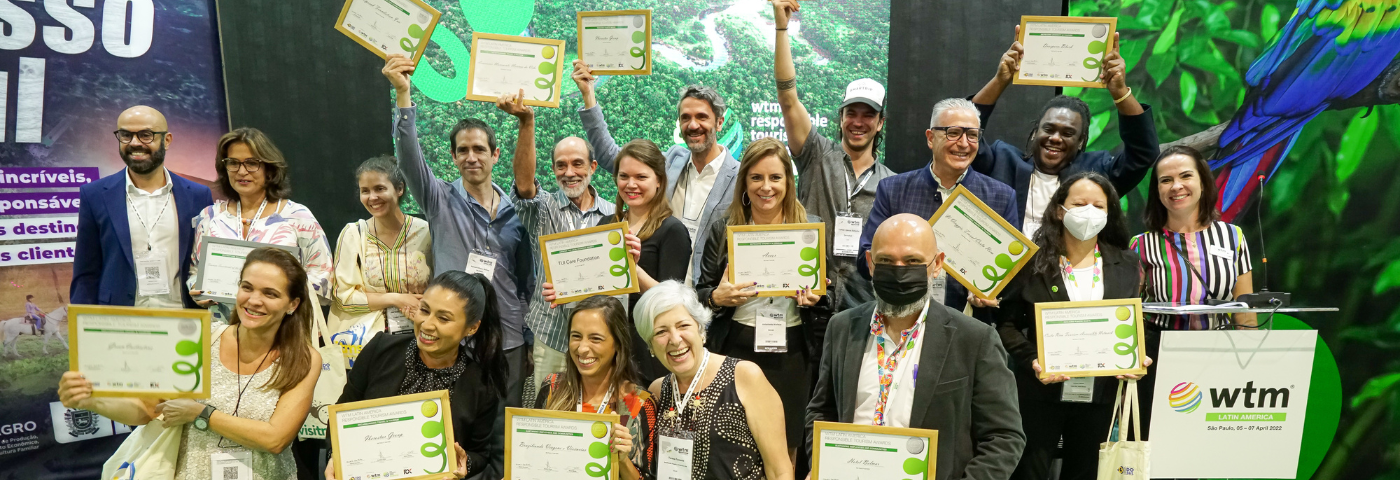*By Gustavo Pinto
In 2022, WTM Latin America held the second edition of the Responsible Tourism Awards, the biggest event held in connection with this topic on our continent. With 06 categories, this year’s edition included dozens of stories that inspire the travel and tourism sector and that offer replicable answers to fundamental questions for the socioeconomic development and environmental conservation of the destinations in which we operate.
What could be observed among the “gold winners”, was that more than just providing creative solutions for taking responsibility, these destinations and enterprises are playing a partially leading role in one of the major trends in our sector, namely sustainable development as a driving factor of strategic planning.
To a large degree technology is the principal agent of these strategies: for example, we learn how the Secretary of State for Tourism of Tamaulipas (Mexico), winner of the “Destinations Rebuilding Better post-pandemic” category, used apps to organize social distancing on its beaches and keep the economy active even in such challenging times for our sector. In the same way, Braziliando, a community-based tour operator with a marked presence in the Brazilian Amazon region and winner of the “Supporting Employees and Communities during the Pandemic” category, used digital media to create the “Baré Connection”, by means of which virtual tourists from all over the world were able to learn about the ways of life of riverside communities in the Amazon region and interact with these residents via the internet, in real time.
The two biggest global problems to be faced by the travel and tourism sector in the 21st century (climate change and single-use plastics consumption), were also highlighted in this edition of the awards. Two initiatives – one operating at a local level, the other on a global level, but both in sun and beach destinations – shared the “gold winner” award in the category “decarbonising the travel and tourism sector”. The Guardians of the Climate brought a highly replicable solution to associate tourism with the development of family farming in order to reduce CO2 emissions in the municipality of Itacaré, in the state of Bahia, Brazil – and in the wake of the award they are already planning to expand their operations to other parts of the country.
On a much larger scale – which corresponds to the size of the business and, as a result, a much broader impact as a result of it taking responsibility, the Grupo Iberostar showed how its “Wave of Change” project works to reduce greenhouse gases based on reforestation and its maintenance of more than 2000 mangroves in the Dominican Republic – this is just one of a number of actions developed so that the entire network’s operation becomes carbon neutral by 2030.
The use of plastic was the theme of the Donatapa project, which was developed by “Red Costarricense de Turismo Accesible” – winner of the category “Reducing the Impact of Plastic Use on the Environment”. With the community collection of plastic bottle the caps that would have gone into the conventional waste, the project has already recycled and constructed more than 500 meters of walkways for the inclusion of people with disabilities and wheelchair users on Costa Rica’s beaches, removing more 56 tons of plastic from nature. In fact, the country has shown itself to be a leading light in the development of solutions in tourism for the inclusion of people with disabilities. Il Viaggio Travel, winner of the category “Increasing the diversity of Inclusion in Tourism”, with the massive inclusion of people with disabilities among its staff and developing tourist experiences for autistic people, including tree climbing, surfing and horse riding.
Last but not least, the socioeconomic development of tourist destinations during the pandemic was the focus of the “Program to Support the Impacts of COVID-19 on Tourism” and the “Tourism Recovery Program” developed by the TUI Foundation. In Mexico alone, the program supported more than 60 ventures, with the highlight going to its in-house team for the technical advice and mentoring they provide to small businesses in destinations in which it operates, showing that the economic recovery of tourism depends on a strong economy regardless of the segment in which it operates.
Inclusion and diversity, climate change, socio-economic development and environmental conservation: the WTM Latin America Responsible Tourism Awards have shown that it is possible to assume responsibilities and, as a result, respond to the main market trends in the travel industry, with technology, waste management, social inclusion and entrepreneurship.
Find out more here about the winners’ stories and be sure you follow the Global Responsible Tourism Awards, which will be held during WTM London, when the Latin American “gold winners” will be competing for the global responsible tourism award.
The opinions expressed in this text are the author’s opinion and do not necessarily reflect the position of WTM Latin America.


